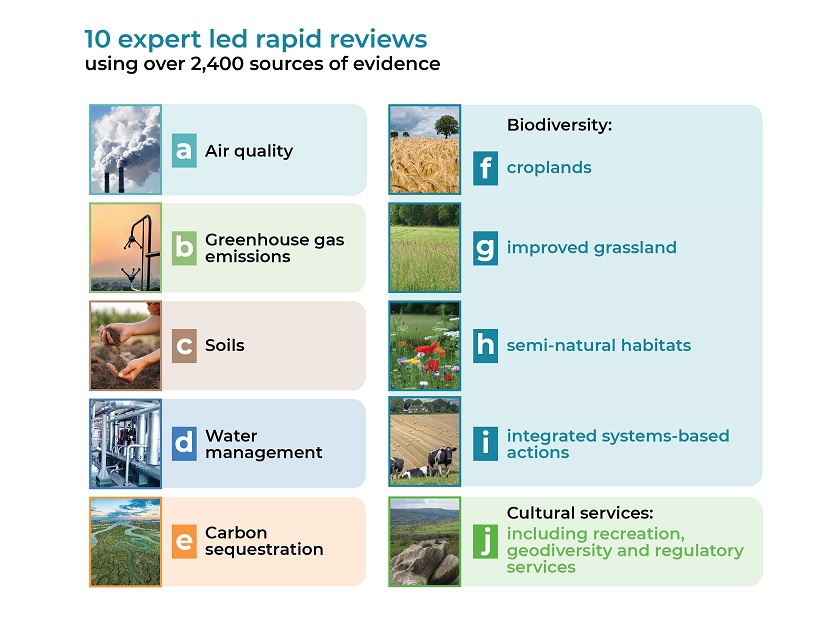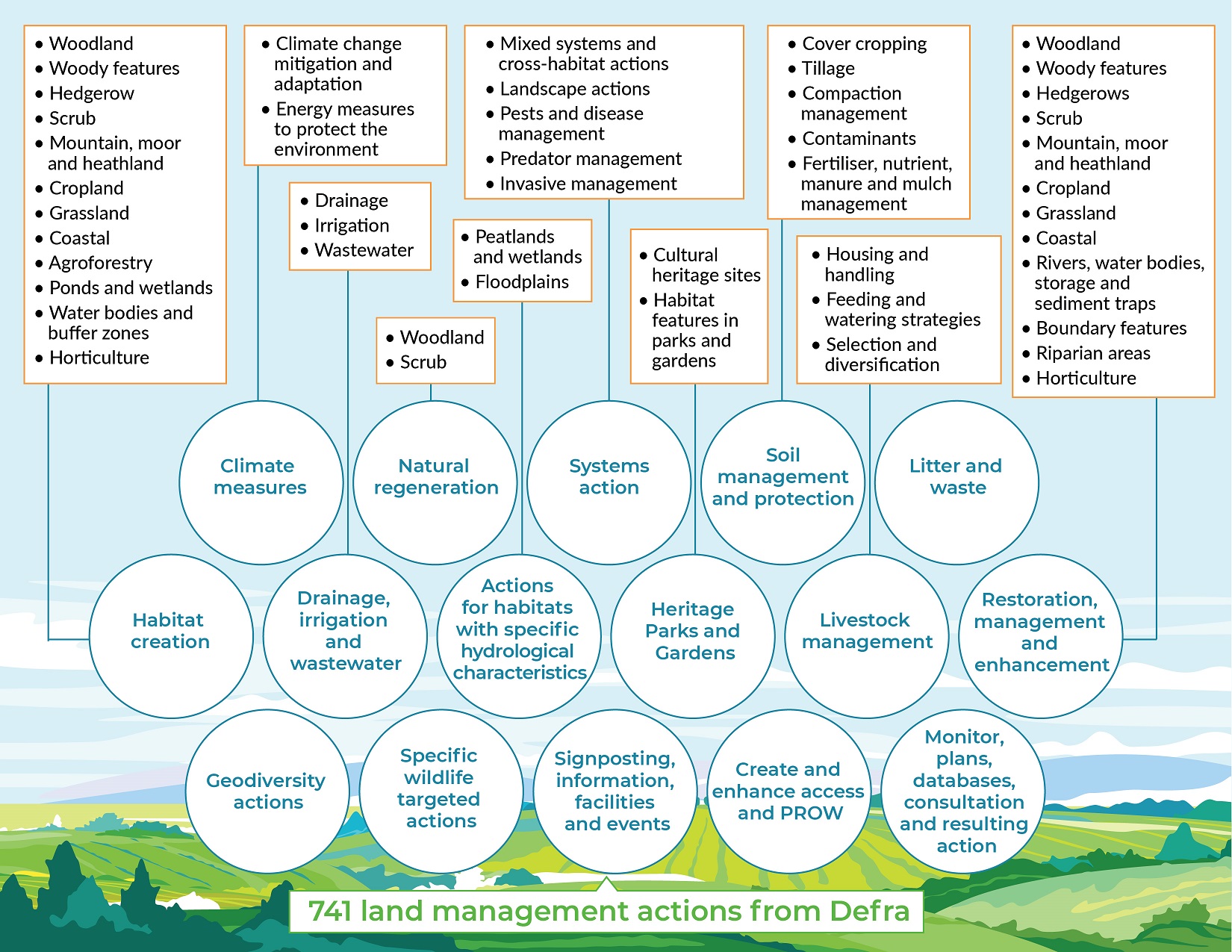Over 45 experts from 10 research organisations have reviewed and rated the effects of different land management actions in a series of reports published today by the UK Government’s Department for Environment, Food and Rural Affairs (Defra).
The evidence is being used to inform new environmental land management (ELM) schemes in England, which fund farmers and land managers to deliver climate and environmental benefits alongside food production, replacing the payments made under the Common Agricultural Policy (CAP).
The three ELM schemes are the Sustainable Farming Incentive, Countryside Stewardship and Landscape Recovery. All three are voluntary, and farmers can choose actions that suit their specific setting. The reports are an important element of the broad evidence base Defra have built to support the development and roll out of these schemes ensuring they take an evidence-based approach.
The production of the reports was led by Professor Bridget Emmett and her team from the UK Centre for Ecology & Hydrology (UKCEH) and involved experts from eight other organisations - the British Trust for Ornithology, ADAS, the Agri-Food and Biosciences Institute, Bangor University, Birnie Consultancy, Forest Research, the Freshwater Habitats Trust. the Institute for European Environmental Policy and CCRI, University of Gloucestershire.

They assessed more than 700 land management actions for their impact on more than 30 ecosystem services – benefits provided to us by the natural environment, ranging from habitat creation to improving air quality, water quality and soil health, preventing floods and drought, reducing greenhouse gas emissions and increasing carbon sequestration. Benefits also include providing access to green space and supporting our cultural heritage.
Trade-offs between ecosystem services and unintended disbenefits were also considered, as well as when the spatial placement of an action is absolutely critical to its success.
The evidence, made up of ten expert reports, all of which have been subject to peer review, references over 2,400 published studies. The reports highlight key actions which are critical to reverse environmental degradation. These including planting hedgerows, creating flower-rich and species-rich grassland, and using very low nutrient and herbicide inputs on permanent grassland. Another list suggests actions with the most benefits across multiple services.
The team has recommended that Defra reviews and updates the work on an ongoing basis to ensure they are always using the best available evidence for the ELM schemes. This work is just part of the evidence base being used by Defra in designing the ELM schemes.
Professor Emmett said: “The team approach, involving many experts from different organisations, has been critical to ensure Defra have received a broad consensus from the scientific community as to the weight of evidence for the management actions they are considering for the ELM schemes.”
Dr Tracie Evans, Head of Natural Science in the Environmental Land Management Team, Defra comments: “The qualitative environmental impact assessment has provided an understanding of the broad environmental impact of land management actions, relevant to agricultural land in England, in a way which allows for comparisons between actions. This valuable evidence base has played a key role in informing and appraising ELM scheme content, having been drawn upon for value for money assessments and to validate the pathways for delivering farming’s contributions towards environmental targets.”
Dr Gavin Siriwardena, BTO lead, said "The integration of evidence for a wide range of environmental and ecological responses to so many types of intervention make this project unique and, I hope, useful to a lot of people.
"From a 'bird perspective', it is particularly valuable to see evidence for contributions to other intended outcomes in the context of management that we expect to benefit birds, and vice versa. This should help to identify 'win-win' approaches, but also identify where important trade-offs need to be considered."
-Ends-

Media enquiries
For interviews and further information, please contact: Simon Williams, Media Relations Officer, UKCEH. Email simwil@ceh.ac.uk or call +44 (0)7920 295384. Graphics illustrating key elements of the report are available on request.
The Defra QEIA Evidence Review and Integrated Assessment Review can be downloaded at https://randd.defra.gov.uk/ProjectDetails?ProjectId=21327
Further information can be found on the UKCEH project page https://www.ceh.ac.uk/our-science/projects/evidence-assessment
Notes for editors
As an EU member state, the UK adhered to the CAP policy of provide financial support to farmers. Following our exit from the EU, devolution has resulted in a divergence of approaches to replace these payments. In England, Defra took the decision for England to phase out CAP payments in favour of Environmental Land Management (ELM) schemes in which farmers are paid for providing environmental, cultural and animal welfare improvements.
The three levels of ELM scheme to reward environmental land management are:
- The Sustainable Farming Incentive (SFI), which pays farmers to manage their land in an environmentally sustainable way.
- Countryside Stewardship, which will pay for more targeted actions related to specific locations, features and habitats.
- Landscape Recovery, which supports landscape and ecosystem recovery through long-term projects, such as peatland and salt marsh restoration.
About the UK Centre for Ecology & Hydrology (UKCEH)
The UK Centre for Ecology & Hydrology is a centre for excellence in environmental science across water, land and air. Our 500-plus scientists seek to understand the environment, how it sustains life and the human impact on it, so that together, people and nature can prosper. UKCEH has a long history of monitoring and assessing agri-environment schemes dating back 30 years.
www.ceh.ac.uk / Twitter: @UK_CEH / LinkedIn: UK Centre for Ecology & Hydrology
About BTO (the British Trust for Ornithology)
BTO is the UK's leading bird research charity. A growing membership and up to 60,000 volunteer birdwatchers contribute to BTO's surveys, collecting information that underpins conservation action in the UK. BTO maintains a staff of 100 at its offices in Thetford, Stirling, Bangor (Wales) and Belfast (Northern Ireland), who analyse and publicise the results of surveys and projects. BTO's work is funded by BTO supporters, government, trusts, industry and conservation organisations.
www.bto.org / Twitter @_BTO